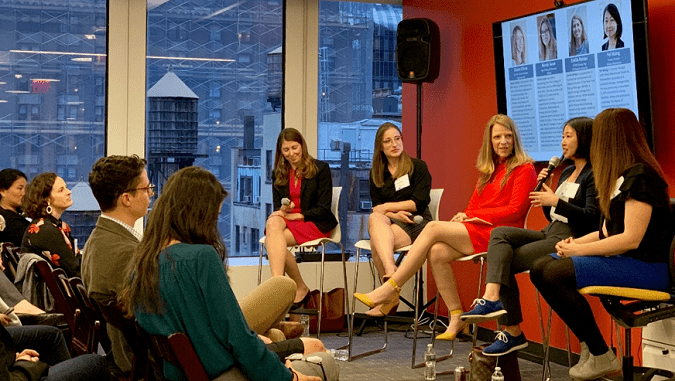
May 31, 2019 | InBrief
Utility workforce of the future
Utility workforce of the future
With baby boomers retiring in record numbers and millennials projected to comprise nearly 75% of the workforce by 2025, utilities are faced with the challenge of recruiting and training the next generation of leaders.
In early May, members of the Greater NY Chapter of the Women’s Energy Network and the NY Chapter of Young Professionals in Energy gathered at West Monroe’s New York City office to discuss the future of utilities and the industry’s workforce needs. A panel of female industry VPs, managers, and directors from National Grid, PSEG, NYPA, and Wood Mackenzie Power Renewables offered their views on the utility workforce of the future.
Attracting and retaining talent in the utility industry
The panelists each shared with attendees how their companies are attracting, developing, and retaining talent. Many utilities are now broadening their recruiting pool by reaching out to younger candidates with less professional experience. By attending STEM events at middle schools and summer programs, these women leaders begin to plant the seed for students to consider a career in the utility industry. Many younger candidates are not sure what working at a utility entails (convinced that it’s nothing but poles and wires), so educating them early can allow them to view the industry in a more exciting and positive light.
A younger generation of workers benefit utilities by breaking down the traditionally hierarchal structure of the organization by leading strategy initiatives, and by being efficient “sponges” with great confidence, who are immune to implicit biases that have plagued generations in the past. They also have a renewed interest in climate change mitigation and sustainability within the energy and transportation sectors. These younger employees are no longer only concerned about rate prices and operating costs; they are also concerned about greenhouse gas emissions that will negatively impact future generations if they do not take action today.
Changing of the guard
When asked what type of skills and capabilities that utility employees are expected to have in the future, the panelists had interesting answers. Though AI, machine learning, and data visualization will be very useful and practical, the most beneficial skill is the ability to manage people effectively and tell a story, then present it. Technology has not yet mastered communication and management, so utility employees will continue to need strong people skills.
The panelists pointed out that an extremely important factor for success of the new generation of workers is their ability to listen effectively to the advice given by retiring workers who likely have been in the industry for decades. According to a 2017 assessment conducted by the Department of Energy, 25% of the utility workforce will be making plans for retirement in the next five years. These retiring workers will be taking a lot of valuable knowledge with them as they leave the industry that cannot be replaced easily. To prevent the loss of retirees’ valuable experience and knowledge, many utilities are creating knowledge transfer programs that include lunch and learns, shadowing of important meetings, and one-on-one coffee chats between those who are about to retire, and those who are new to the field. Transfer through meaningful mentorship is necessary to avoid making the same mistakes that have been made in the past and to build a deeper understanding of the knowledge acquired throughout the years.
Satisfying the next generation of customer demands
In addition to the rapid changes to the workforce, utilities themselves will also have to adjust to the future needs of customers. Panelists gave mixed answers when asked whether utilities should begin to function like Amazon or Google, providing first-rate service and the ability to transact 24/7, or continue their one-way communication practices. On one hand, utilities have a narrow and specific set of demands that differ from tech companies, who provide customers with a very wide range of services. This means that there is a larger need for various forms of support and troubleshooting options for tech companies, that may not necessarily be needed for utilities. On the other hand, a streamlined tracking and billing process, attractive web interface and increase in communication between the customer and utility has been seen to make lasting impacts on customer satisfaction, which is the ultimate goal of many utilities.
Nicole Swan, a manager of billing and revenue from PSEG, shared an experience where increasing customer service through enhancing her company’s social media presence resulted in an entire department being dedicated to responding to any customer needs. This allowed the company to be there when the customer needed them, and not just during outages. Though they weren’t available 24/7 like most tech companies, they extended their hours by making themselves available from 8 am to 10 pm, which satisfied the needs of their customers. Utilities have a full plate keeping up with the rise of the digital marketplace, evolving customer expectations, and rapid advancements in technology. After sitting with and learning from this accomplished group, it was clear that they not only have an effective plan for the future, but are very confident in the next generation’s ability to close the generation gap and to lead in a sustainable and inclusive way.



